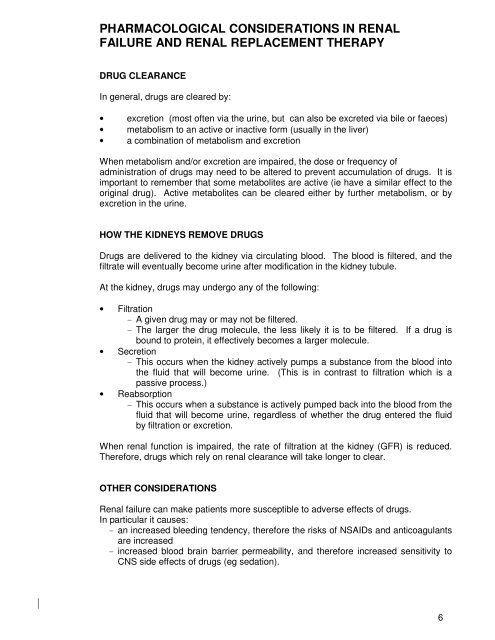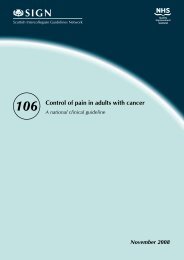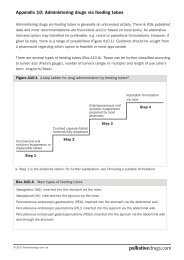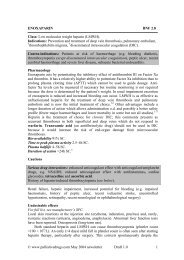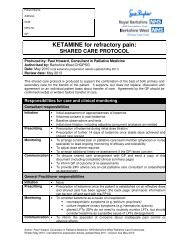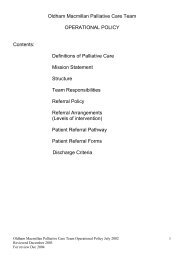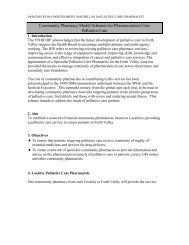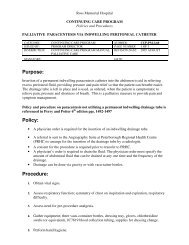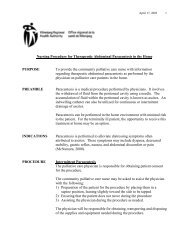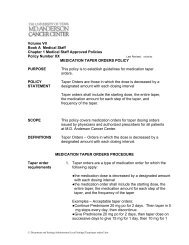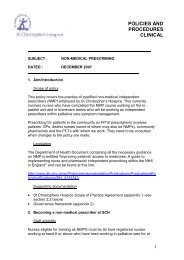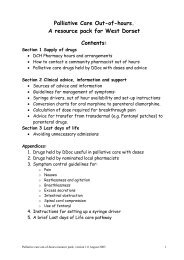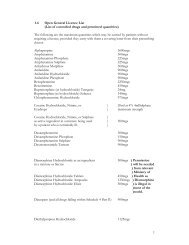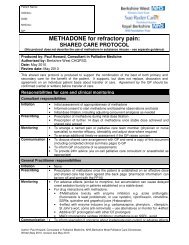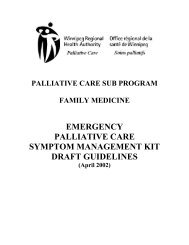Clinical Guidelines for the use of Palliative Care Drugs in Renal ...
Clinical Guidelines for the use of Palliative Care Drugs in Renal ...
Clinical Guidelines for the use of Palliative Care Drugs in Renal ...
You also want an ePaper? Increase the reach of your titles
YUMPU automatically turns print PDFs into web optimized ePapers that Google loves.
PHARMACOLOGICAL CONSIDERATIONS IN RENAL<br />
FAILURE AND RENAL REPLACEMENT THERAPY<br />
DRUG CLEARANCE<br />
In general, drugs are cleared by:<br />
• excretion (most <strong>of</strong>ten via <strong>the</strong> ur<strong>in</strong>e, but can also be excreted via bile or faeces)<br />
• metabolism to an active or <strong>in</strong>active <strong>for</strong>m (usually <strong>in</strong> <strong>the</strong> liver)<br />
• a comb<strong>in</strong>ation <strong>of</strong> metabolism and excretion<br />
When metabolism and/or excretion are impaired, <strong>the</strong> dose or frequency <strong>of</strong><br />
adm<strong>in</strong>istration <strong>of</strong> drugs may need to be altered to prevent accumulation <strong>of</strong> drugs. It is<br />
important to remember that some metabolites are active (ie have a similar effect to <strong>the</strong><br />
orig<strong>in</strong>al drug). Active metabolites can be cleared ei<strong>the</strong>r by fur<strong>the</strong>r metabolism, or by<br />
excretion <strong>in</strong> <strong>the</strong> ur<strong>in</strong>e.<br />
HOW THE KIDNEYS REMOVE DRUGS<br />
<strong>Drugs</strong> are delivered to <strong>the</strong> kidney via circulat<strong>in</strong>g blood. The blood is filtered, and <strong>the</strong><br />
filtrate will eventually become ur<strong>in</strong>e after modification <strong>in</strong> <strong>the</strong> kidney tubule.<br />
At <strong>the</strong> kidney, drugs may undergo any <strong>of</strong> <strong>the</strong> follow<strong>in</strong>g:<br />
• Filtration<br />
- A given drug may or may not be filtered.<br />
- The larger <strong>the</strong> drug molecule, <strong>the</strong> less likely it is to be filtered. If a drug is<br />
bound to prote<strong>in</strong>, it effectively becomes a larger molecule.<br />
• Secretion<br />
- This occurs when <strong>the</strong> kidney actively pumps a substance from <strong>the</strong> blood <strong>in</strong>to<br />
<strong>the</strong> fluid that will become ur<strong>in</strong>e. (This is <strong>in</strong> contrast to filtration which is a<br />
passive process.)<br />
• Reabsorption<br />
- This occurs when a substance is actively pumped back <strong>in</strong>to <strong>the</strong> blood from <strong>the</strong><br />
fluid that will become ur<strong>in</strong>e, regardless <strong>of</strong> whe<strong>the</strong>r <strong>the</strong> drug entered <strong>the</strong> fluid<br />
by filtration or excretion.<br />
When renal function is impaired, <strong>the</strong> rate <strong>of</strong> filtration at <strong>the</strong> kidney (GFR) is reduced.<br />
There<strong>for</strong>e, drugs which rely on renal clearance will take longer to clear.<br />
OTHER CONSIDERATIONS<br />
<strong>Renal</strong> failure can make patients more susceptible to adverse effects <strong>of</strong> drugs.<br />
In particular it ca<strong>use</strong>s:<br />
- an <strong>in</strong>creased bleed<strong>in</strong>g tendency, <strong>the</strong>re<strong>for</strong>e <strong>the</strong> risks <strong>of</strong> NSAIDs and anticoagulants<br />
are <strong>in</strong>creased<br />
- <strong>in</strong>creased blood bra<strong>in</strong> barrier permeability, and <strong>the</strong>re<strong>for</strong>e <strong>in</strong>creased sensitivity to<br />
CNS side effects <strong>of</strong> drugs (eg sedation).<br />
6


